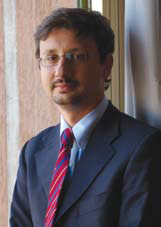A market develops and grows well if all the "pieces" fit perfectly together

Francesco Rodano - Italy, "Head of Director-General's staff and Head of remote gaming", AAMS - Amministrazione autonoma dei monopoli di Stato
How the online gaming should be regulated?
There are a few points I'd like to highlight about an ideal online gaming regulation. First, I think that all kind of games should be regulated. On the Internet, strict prohibition doesn't work well. If something is freely available abroad, people will always try to get it, no matter how hard we try to block them. So, at the end of the day, it's much better to let them play in a safe and controlled environment, in which we can avoid frauds and manage the players' complains, rather than closing the eyes while they get "squeezed" by some unknown offshore operator. Second, it's up to each government whether to manage the gaming on their own or give licenses or concessions to private operators. This latter case has the advantage to avoid the "competition" with the large foreign operators, that could decide, if the conditions are right, to apply for a license in the country, instead of trying to attract people from abroad. Third, taxation should be "fair" and not burdensome. Online gaming could be a source of considerable tax money for a country, but only if the tax level is correctly set. Otherwise deciding to invest in a country could be not cost-effective for the operators and, again, the competition with the unlicensed (tax free) operators would be unbearable.
Is there a good regulatory model for online gaming and what are its main characteristics?
It may seem obvious, but I think that our model, even if far from perfect, is a good one. We represent a sort of balanced third way between strict monopolies and completely open systems. Let's say that we are in a "regulated liberalization" scenario. Our strong principle is: if you want to collect money from the Italian citizens you must have an Italian license and operate under our rules. But any gaming operator, Italian or foreign, that is compliant to our requirements, can apply for a license, without limits in terms of number of licenses that we can grant. The licensing conditions are the object of a new decree that we notified to the European Commission a couple of months ago, and we got a positive feedback from them. So we are confident that our model could be well working also for the other European countries currently in the Commission's sights. This opinion is reinforced by the fact that several delegations from European governments have visited us (or will do it in the near future) to study and better understand our system, with a view to the forthcoming confrontation with the Commission itself. There is room to improve, though. We are still missing the regulation of some important games categories, but, again, I believe we are on the right track, and the results both in terms of turnover and in terms of number of foreign operators applying for an Italian license, are quite comforting.
Do you think that the regulation of online gaming should be settled on in an international level?
Yes, definitely, at least at the EU level. Probably that is a sort of utopia, right now. There are too many different, if not opposite views within the governments about the role of online gaming regulation (and of gaming in general). But a harmonized regulation on online gaming would bring enormous advantages. The operator's gaming platform could be located everywhere in the EU , and the European players would be also allowed to play against each other (for instance on an online poker table). The operators would pay the (harmonized) taxes to each country, based on the revenues obtained by that country's players. In this scenario, one regulator could cooperate with another not only in the authorization process, sharing his knowledge about the operators based in his country, but they could also work together against fraud and players collusion, or on money laundering investigation, or, again, in better understanding the betting markets that are based on sports and events that take place in their respective countries.
In what way the legitimate interests of all the parties should be protected in respect of the online gaming, including players, operators and the state?
The "bet" is exactly this: finding a model that reconciles all those interests, that seem diverging, but I don't think they actually are. A market is like a puzzle. It develops and grows well if all the "pieces" fit perfectly together. In our case, if one component (player, operator, state) was unsatisfied with the gaming model (for instance the players feel defrauded, the operators loose money, the state notices too much compulsive gambling), all the sector would quickly collapse. So I believe that it is mandatory, before approaching the regulation, to thoroughly understand the characteristics and the needs of every component, talking to everyone and studying all the best practices around. Then, and only then, it is possible to set the rules.
How do you see the future of online gaming?
Given both the speed of the technological development and the evolving dynamics of consumer tastes, it is really hard to say. Also, due to the "stickiness" of the administrative and legislation processes, the regulation is never quick enough to adapt to these changes, when instead it should anticipate them. Anyway, I think that the meaning of "online" will really broaden in the future. It will be possible for the player to seamlessly access their favourite games from virtually anywhere (television, mobile phones, wi-fi appliances and so on). . And, with the introduction of new kind of games (like the "games of skill"), I believe that the online gaming will gradually become a "pure entertainment" activity, involving more people, which are traditionally distrustful, and finally loosing the negative connotation of "gambling".


































rules for writing comments